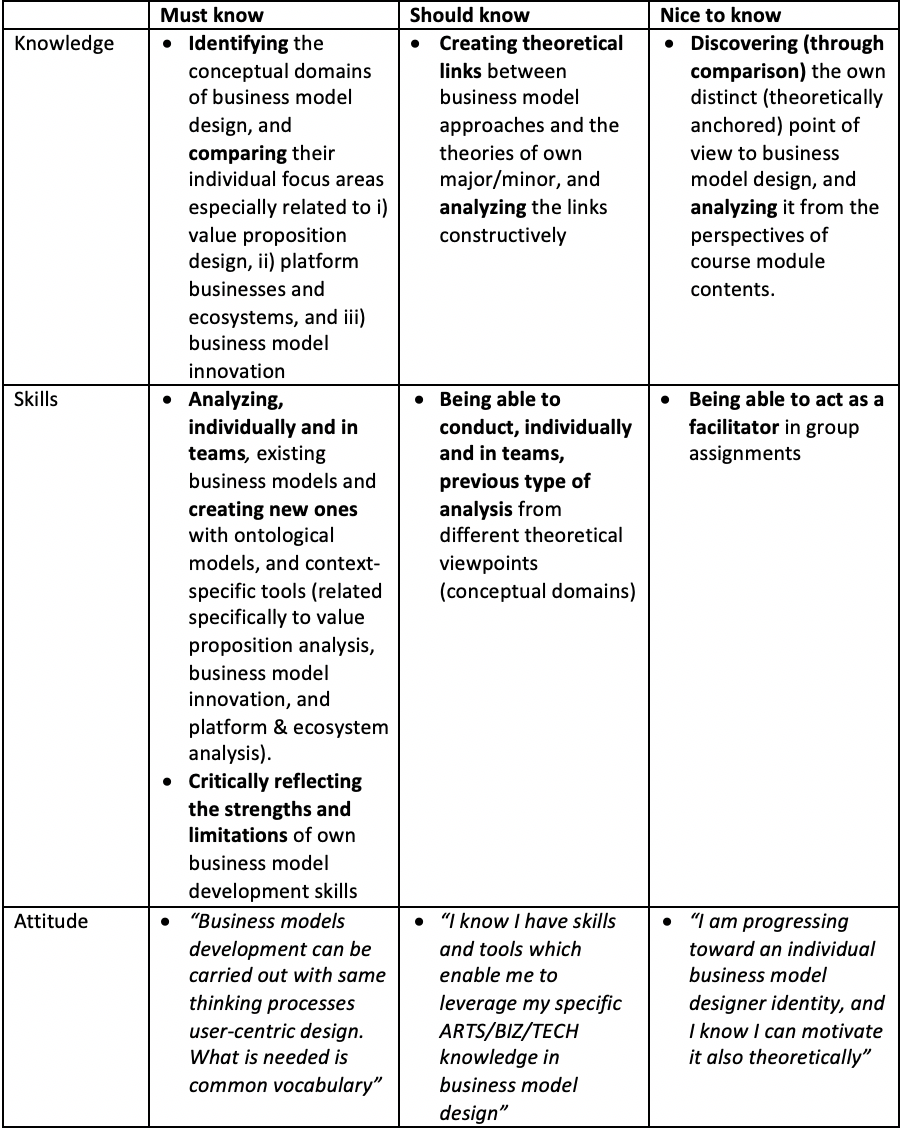26E04350 - Business Model Design, Lecture, 28.2.2022-7.4.2022
This course space end date is set to 07.04.2022 Search Courses: 26E04350
Topic outline
-
Welcome to Business Model Design Course!
UPDATES
- Course will start on week 10, first lecture Monday 7th at 12.15.
- Thursday 7.4 CLASSROOM workshop held in room Q202 Ryhmäopetus 9.15-11.00.
- Virtual workshop uses the same Zoom address as the Monday lectures.
Zoom link and information for all the sessions:
- https://aalto.zoom.us/j/62165035614?pwd=eHBzMUZ0WWFXSVhWYlRMc1pjZmtWdz09
- Meeting ID: 621 6503 5614, Passcode: 064452
- https://aalto.zoom.us/j/62165035614?pwd=eHBzMUZ0WWFXSVhWYlRMc1pjZmtWdz09
Basic information
- Business Model Design, 26E04350, AALTO BIZ
- Teaching language: English
- Credits: 5-6 ECTS
- Teaching period IV
- Master's level course
- It is recommended to take this course during the first year of IDBM studies
- It is also recommended to take IDBM Challenge (JOIN-E7006) before this course
- One should take this course before Industry project course (JOIN-E7005)(does not apply to Sugar/Global project teams!)
- Minimum of 70% participation needed due to interactive tasks
- You must attend the first session to ensure your place in the course
Connection to IDBM programme
Business Model Design connects transdisciplinary thinking to business model context. The approach is both theoretical (mostly individual assignments) and practical (mostly in interactive tasks done in the workshops). The aim of all this is to form a holistic picture of business model design, especially from design management perspective.
The course acknowledges that most of the students already know something about business development, and some students have a lot of business expertise. However, a common theoretical backbone is needed, as well as a common language (concept hierarchy), and a common set of tools.
Teaching methods
Teaching methods emphasize interactive and reflective techniques.
Each week is divided to keynote and discussion day (Mondays) and workshop and reflection days (Thursdays). Thursday workshops are divided to two groups to facilitate more efficient mentoring and more extensive discussions during workshops, and to accommodate different study mode preferences (virtual/physical). Students must select from two different workshop times when they enroll the course.
Evaluation and deliverables
In evaluation, the teaching team focuses in the level of critical and reflective thinking and communication. Connecting theoretical knowledge and practical examples is a strong merit. Biggs model (1991) is used in assessment (see more information on instroduction slides).Course deliverables include: 1) weekly journals (student can select from different journal styles 2) active participation and 3) take-home exam (larger independent writing task).
Course structure
Course content is divided to modules: one week is one module, as follows:
- MODULE 1: Detrivializing shared value
- MODULE 2: What it takes to put value first
- MODULE 3: Resilience and adaptability in business models
- MODULE 4: Platform business models
- MODULE 5: Sustainable business model innovation and course summary
Course schedule:- Business Model Design, 26E04350, AALTO BIZ
28.2.-6.3 NO TEACHING!
Everyone needs a break after the exam week :)
7.3.-13.3. Module 1
Monday 12-14. Thursday (two different groups - you will select one)
21.3.-27.3. Module 3Monday 12-14. Thursday (two different groups - you will select one)28.3.-3.4. Module 4
Monday 12-14. Thursday (two different groups - you will select one)4.4.-10.4. Module 5
Monday 12-14. Thursday (two different groups - you will select one)11.4- 17.4 EXAM WEEK (Time to return take home exam)Deliverable schedule
- Individual journal deadline each week, DL the each sunday before the monday lecture module
- Take-home exam: Questions published on Monday of the evaluation week; Deadline on Sunday of the evaluation week.
Core content analysis

- Individual journal deadline each week, DL the each sunday before the monday lecture module
